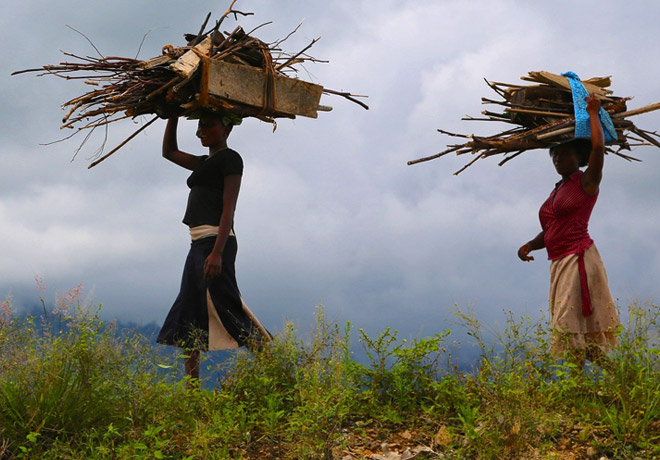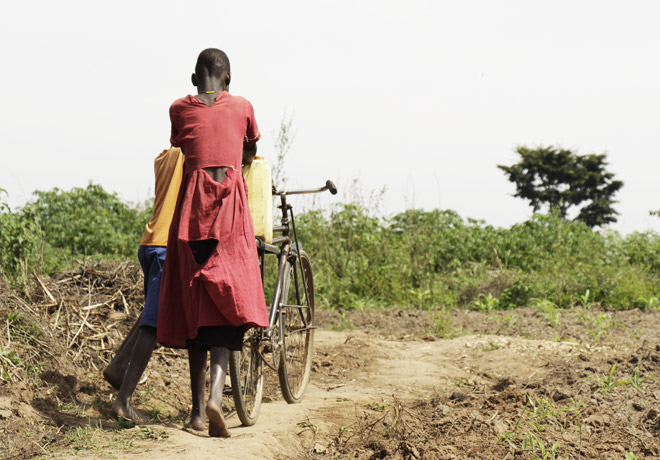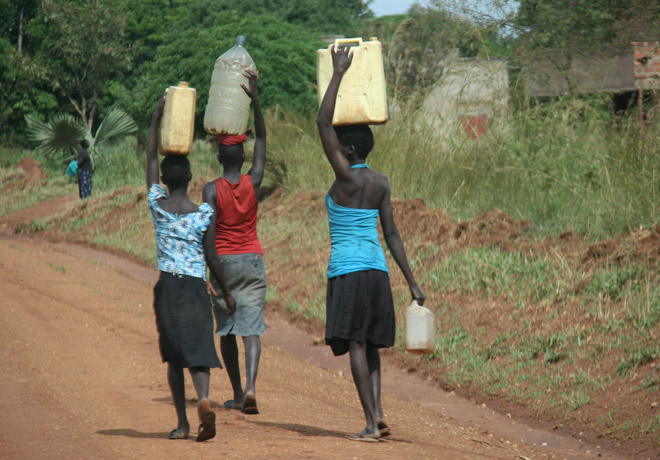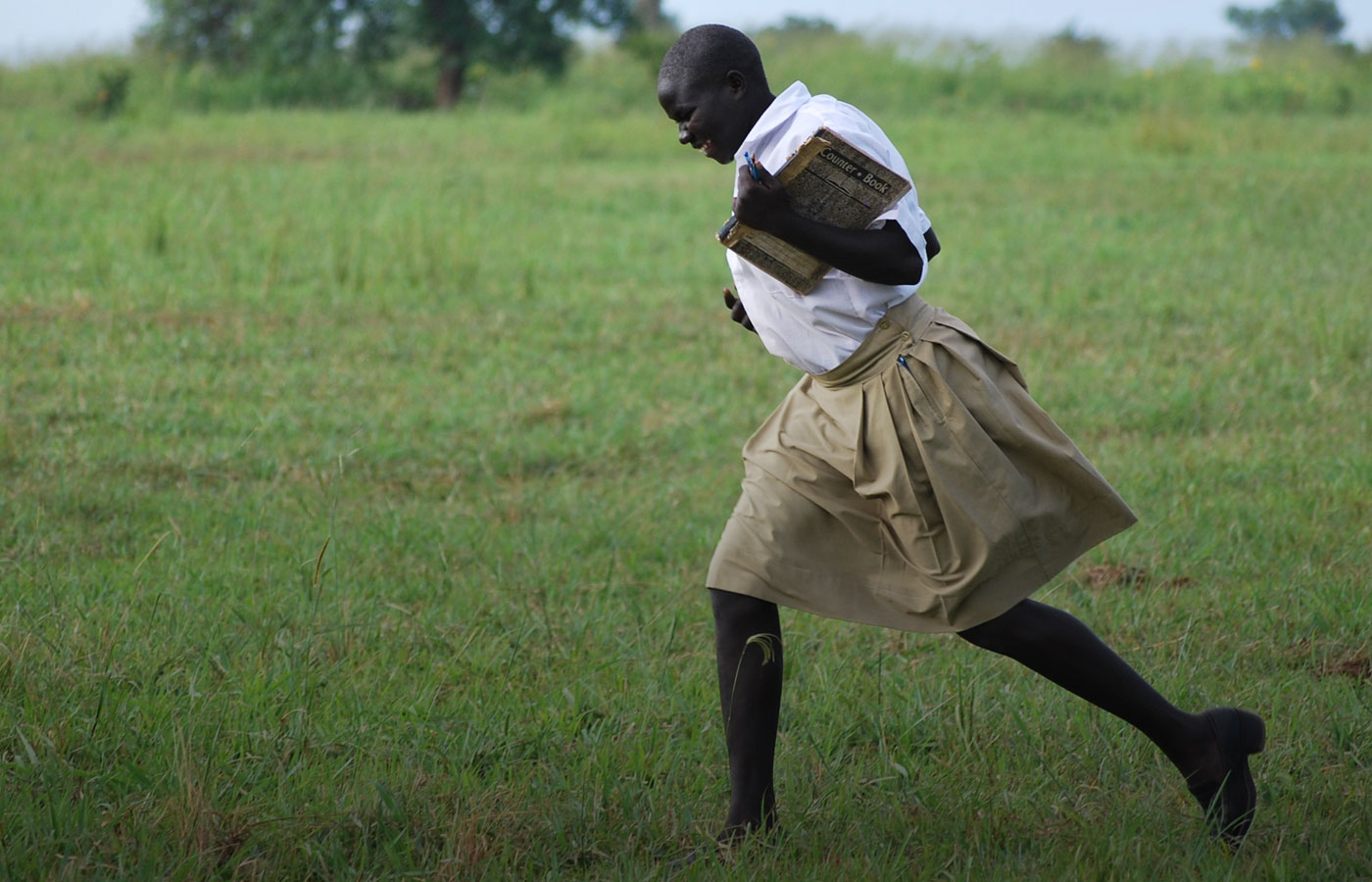Between 1985 and 2005 in Uganda, tens of thousands of girls were abducted, raped, and forcibly conscripted into the Lord’s Resistance Army (LRA).[1] During their captivity, these girls suffered unimaginable sexual and physical violence as ‘forced wives’ to commanders and ‘forced mothers’ to their children.[2] As remuneration, the higher-ranked commanders were given multiple wives to marry forcibly and impregnate.[3]
Tens of thousands of girls were abducted, raped, and forcibly conscripted into the Lord’s Resistance Army.
These and other harmful practices were a re-enactment of prevalent social norms and gendered biases deeply rooted in the patriarchal structure of Uganda’s culture. If girl child-soldiers are to be given full opportunities to heal in the reintegration process, then a concerted societal strategy is needed to eradicate these patriarchal attitudes and practices. This strategy must be designed to break the cycle of intergenerational transmission of gendered biases, stigmas, and violence against girls and women.[4] The intent of this article is not to ‘Africanize’ this global phenomenon of girl child-soldiers. Rather, this article addresses the implications of some pre-conflict gendered biases in the reintegration process of girl child-soldiers into post-conflict society. The LRA girl child-soldier phenomenon is used as an example.

Pre-conflict gender biases and stigmas
One of the primary sources of pre-conflict gender biases and stigmas against girls is Uganda’s attitude toward marriage as a socioeconomic institution. In such a patriarchal community, girls are treated as commodities and their value is solely determined by their bride-wealth and ability to bear children. [5] As a cultural norm, early marriage is encouraged and practiced. Girls are sometimes pressured to drop out of school so that the family can prosper from bride-wealth. Thus, bride-wealth serves to reinforce male dominance and gendered bias.
Similarly, the acceptance of polygamy also perpetuates gendered biases and sexual violence against girls. In some communities, multiple spouses are accepted for men but not women. This practice also intensifies male dominance and the abuse of girls and women. Consequently, sexual violence against girls and women is accepted with impunity and normalized.[6] Hence, the lack of accountability for perpetrators of sexual violence legitimatizes and emboldens all men in the society to exploit girls and women. Oftentimes, girls violated through rape and sexual violence are subjected to ridicule and are stigmatized as promiscuous and ‘devalued’ as unmarriable.
Another significant pre-conflict source of stigmatization stems from the belief in the phenomenon of cen (revenging spirits).
Another significant pre-conflict source of stigmatization stems from the belief in the phenomenon of cen (revenging spirits). In the context of Uganda’s hyper-spiritualized culture, cen is believed to be the presence of enigmatic spiritual manifestations of evil spirits possessing the living. Whenever evil occurs, either in the life of a wrongdoer, his/her family, or community, it is attributed to the spirit of the one wronged or killed seeking revenge. This revenge is believed to continue until the death is compensated for and the spirit is appeased. In many aspects, illnesses, sicknesses, and misfortunes are associated with harassment by cen. Consequently, those who are believed to be harassed by cen are branded as extremely dangerous to the community and are thus stigmatized and ostracized.
The persistence of these and other pre-conflict patriarchal attitudes and spiritual practices contribute to the re-traumatization of girl child-soldiers endeavoring to reintegrate into post-conflict society.
Some implications
In 2006, the LRA was driven out of Northern Uganda. However, gendered biases, violence, and stigmas against girl child-soldiers remain as major barriers to returnees attempting to reintegrate into civilian life. Girl child-soldiers and their children born during captivity have become the most stigmatized and ostracized population in Uganda. People reject them because they are a constant reminder of the atrocities that occurred during the war. Particularly, former girl child-soldiers are perceived as having been sexually violated and are thus rejected and stigmatized as damaged girls.[7] Consequently, girl child-soldiers are devalued in the eyes of the community as no longer marketable for a bride’s wealth.
Another impediment to the reintegration process stems from the belief that cen is prevalent among former girl child-soldiers. Girl returnees who suffer with health problems such as fistulas, HIV/AIDS, and post-traumatic stress disorders are feared as potentially dangerous and stigmatized as possessed by cen. The symptoms of cen are often described as nightmares, hearing voices, guilty or sad feelings, anxiety, and various forms of depression.
Confronting the communal concerns of cen is crucial to the reintegration process of girl child-soldiers.
Some girl child-soldiers have reported that symptoms of cen were not experienced as much in the bush as in the communities to which they are returning. This may indicate that cen is a byproduct of communal rejection and stigmatization. Therefore, confronting the communal concerns of cen is crucial to the reintegration process of girl child-soldiers.
The continuous rejection and stigmatization of returning girl child-soldiers often left them destitute and feeling hopeless. This leads to a cycle of re-victimization and re-traumatization. For some girls, the inability to care for themselves or their children forced them to resort to crime, prostitution, and relationships with abusive men for survival. Experiences of verbal abuse and sexual assault by family and community members was reportedly widespread and regarded with impunity.[8]

Hence, post-conflict Uganda presents girl child-soldiers with a social dilemma whereby societal norms reject them, and they are excluded based on the effects of their wartime traumatization. Both are challenges to the successful reintegration of girl child-soldiers into a normal life. Therefore, reintegration must incorporate a gendered approach that is sensitive to the implications of societal gender biases and stigmas. Without a gendered approach, successful reintegration of former girl child soldiers will remain a difficult task for many girls and continue to perpetuate the traumatization of girl child-soldiers in the aftermath of war.
Suggested Christian NGO responses
 1. Biblical response
1. Biblical response
Christian NGOs should provide the Gospel in conjunction with effective reintegration services to equip girl child-soldiers to return to civilian life. Specifically, the problem of cen must be confronted from a contextually relevant biblical perspective, both privately with the former girl child-soldier, and publicly with the community.
It may be useful to use a paradigm shift approach to formulate a biblical response to the problem of cen:
- The new paradigm must refute the identity of the revenging spirits as manifestations of the dead.
- The Christian NGO must rightly teach and identify cen spirits as manifestations of demons.
Such an approach should first proceed from a comprehensive understanding of the contextualized spiritual world within the culture. How do people in the community understand and relate to cen? In other words, cen must be approached as a spiritual reality. Second, it is imperative to communicate that believers in Jesus Christ have power over demonic spirits through the power of the indwelling Holy Spirit. Finally, it is important to teach that all retribution and vengeance belongs to God alone.
 2. Spiritual response
2. Spiritual response
Societies that believe in evil spirits also believe that evil spirits can be exorcised from people and communities. Traditionally, cen is something that is dealt with through blood sacrifices of animals, whereby slaughtered animals are cooked and eaten, and through a ceremony in which water is sprinkled on the feet of those who walked on the dead. Since cen is perceived as a spiritual problem, perhaps the public Christian sacraments of baptism and the Lord’s Supper can be the public antidote to convince both the former girl child-soldier and the community that their sins of the past are forgiven and washed away. When necessary, under the direction of the Holy Spirit and in the manner that Jesus taught his disciples, demons should be cast out of those affected by cen.
.
 3. Educational response
3. Educational response
Cen must also be challenged through practical communal education. Reportedly, child soldiers who have converted to Christianity have recommended effective ways to deal with cen. For instance, a 12-year-old boy related a story of another ex-child soldier who was accepted in the community because he told everyone about how he always shot to miss and allowed those he was supposed to kill to escape. He claims, ‘This boy has no problem with cen at all.’[9] This 12-year-old child understood that communal rejection is a potential root of cen. Perhaps, Christian NGOs should educate communities on the power of love and acceptance to chase away cen.
In the aftermath of war, Uganda is ripe for gospel seeds to be planted and watered. It may be that God is presenting the church with an opportunity to empower future generations of girls and women to overcome the gendered oppression of a patriarchal society. Some girl child-soldiers, while in captivity, have recognized their ability to lead as commanders in the LRA. Others learned they have an innate resilience to survive; and some have used these strengths to empower others to walk in freedom from the trauma of their past. ‘Empowering women is what women do best’ is the slogan of Empowering Hands, an indigenous NGO founded by four former girl child-soldiers who have survived the ‘reintegrate and reject’ cycle of the reintegration process.[10]

Conclusion
Girl child-soldiers who suffered horrendous sexual violence and psychological trauma are re-traumatized and re-victimized during the reintegration process. The realities of their gender-specific experiences in society must be considered in the reintegration process. Reintegration programs must adopt a gendered sensitive approach that addresses the distinct experiences of girl child-soldiers returning to a patriarchal society that accepts their violations as normative.[11]
The deep-seated attitudes and practices of gendered biases and stigmas that permeate every aspect of patriarchal societies must be challenged. Christian NGOs must ensure that the human rights of all girl child-soldiers are restored with dignity. This is vitally important. It underscores the conviction that the investments in the reintegration of girl child-soldiers into society will empower future generations of girls and women to contribute to the rebuilding of communities in which all people can live in peace with dignity and prosperity.[12]
Endnotes
- Annan, Jeanie, Chris Blattman, Kristopher Carlson and Dyan Mazurana, The State of Youth and Youth Protection in Northern Uganda: Findings from the Survey for War Affected Youth (SWAY), phase II, Survey of War-Affected Youth (2008), 33. https://chrisblattman.com/documents/policy/sway/SWAY.Phase2.FinalReport.pdf.
- McKay, Susan, and Dyan E. Mazurana. Where Are the Girls? Girls in Fighting Forces in Northern Uganda, Sierre Leone and Mozambique: Their Lives During and After War, Rights & Democracy. Montréal: International Centre for Human Rights and Democratic Development, 2004. https://www1.essex.ac.uk/armedcon/story_id/000478.pdf.
- Jeannie Annan, Christopher Blattman, Dyan Mazurana, and Khristopher Carlson, ‘Civil War, Reintegration, and Gender in northern Uganda’, Journal of Conflict Resolution, (2011):10. http://www.chrisblattman.com/documents/research/2011.CivilWarReintegrationGender.JCR.pdf.
- Data taken from World Vision website on the Uganda culture. http://www.everyculture.com/To-Z/Uganda.html#ixzz3u9ZUZsmU.
- The bride-wealth is a dowry paid to the girl’s family or clan from the man’s family or clan in a traditional wedding.
- Editor’s Note: See article by Olivia Jackson, entitled, ‘Sexual Violence in War’, in July 2015 issue of Lausanne Global Analysis https://lausanne.org/content/lga/2015-07/sexual-violence-in-war.
- Chris Coulter, Bush Wives and Girl Soldiers: Women’s Lives through War and Peacein Sierra Leone, Cornell Paperbacks (Ithaca: Cornell University Press, 2009), 227.
- FIDH: Women’s Rights in Uganda: Gaps between policy ad practice. https://www.fidh.org/IMG/pdf/uganda582afinal.pdf
- Grace Akello, Annemiek Richters & Ria Reis. Reintegration of former child soldiers in northern Uganda: coming to terms with children’s agency and accountability, 241.
- The girls are: Milly Auma, Nighty Acheng and Sarah Ayero. Glamour article on Empowering Hands. Empowering Hands presentation says that 36 women form Empowering Hands. http://www.glamour.com/inspired/women-of-the-year/2007/11/empowering-hands.
- Editor’s Note: See article by Gladys Mwiti and Bradford Smith, entitled, ‘Turning the Church’s Attention to Mental Health’, in November 2018 issue of Lausanne Global Analysis https://lausanne.org/content/lga/turning-the-churchs-attention-to-mental-health.
- Suggested further reading: Chris Coulter, Bush Wives and Girl Soldiers: Women’s Lives through War and Peace in Sierra Leone, Cornell Paperbacks (Ithaca: Cornell University Press, 2009); Bård Mæland ed., Bible and Theology in Africa, Culture, Religion, and the Reintegration of Female Child Soldiers in Northern Uganda, vol. 10 (New York: Peter Lang, 2010); Vhumani Magezi & T. Myambo, ‘Pastoral challenges and responses to fear of avenging spirits (ngozi) in Africa: A biblical evaluation and response – a case of the Shona people’, in die Skriflig, 45 (2011): 161-87. 10.4102/ids.v45i1.10. http://www.scielo.org.za/pdf/ids/v45n1/10.pdf; Faith J H McDonnell and Grace Akallo. Girl Soldier: A Story of Hope for Northern Uganda’s Children (Grand Rapids: Chosen, 2007).

